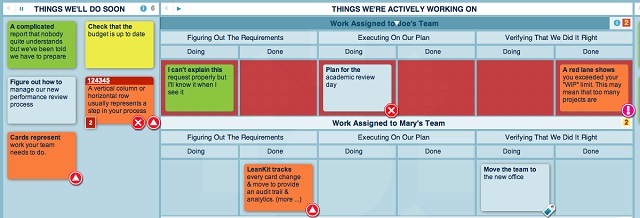
Sam is a Director of English at an academy in Norwich and has been teaching for eight years; he is committed to blogging and collaborative approaches to developing teaching and learning. He regularly blogs the successful implementation of SOLO in the classroom, as well as the development of metacognitive strength in pupils. In the classroom he ipis a techno-enthusiast always exploring ways of improving and facilitating great learning experiences. Sam has worked with Norfolk LEA advising on successful APP strategies.
Sam Marfleet discusses implementing the 'Kanban method' as a project management tool for departmental improvement plans. This method places an emphasis on initiating smaller and more gradual changes to the department that respects current roles and responsiblities, in contrast to a more sweeping and high-risk approach.
In an organisational framework, Sam defines 6 steps of progression from entertaining an idea to deciding how to execute it, and ultimately evaluate its effectiveness.

I want to ask a question about team improvement plans and whether they are the most valuable method of communicating the developmental needs of a department.
Do they translate into efficient practices? Are they understood and regularly considered by the team? Can anyone look at such a plan and understand what a department's priorities and actions are within, say, a two week period?

I was wondering how useful your schools' marking policy was to you as a teacher and, of course, to your pupils.
Marking policies are there to help teachers have a common framework by which they can regularly assess their pupils; this is useful enough and many have a timeframe attached. For example, they may state that marking must be carried out every three weeks.
Clearly, the idea is that pupils need regular feedback on their written work and this is often interpreted by time-pressured teachers who quickly tick through notes and add depth to one 'substantial' piece of writing. This is an example of an asynchronous process and, in my opinion, it is not particularly helpful for pupils or teachers!
The depth of the feedback offered can be as detailed as anyone may ask: literacy/numeracy comments, next steps, grades or levels, literacy/numeracy levels and feedback by pupils. The best assessment, however, is not driven by imposed windows of time.

Daniel Edwards (read: @headguruteacher) was absolutely correct when he argued that too often we misjudge the impact of our work relative to the effort we have put in. He is right to focus on curriculum, timetabling, performance management and assessment 'overkill'; these all offer plenty of inefficiency and I fully agree that you really can have too much data.
This last is quite a statement and I know that in the past I have been known as a full on data fiend. It was, however, appropriate to its' context. I had started at a school in Special Measures and data in English was all but non-existent. What there was lacked rigour and too many pupils were able to slip through the net. This situation demanded a focused approach to gathering, interpreting and using data; the investment in time into this collation of data was appropriate, because the department was now able to monitor, support and improve the learning of pupils.

A resilient learner is not one that plugs away, writing everything down and not seeming to mind if they continue to get the same grade. Neither, obviously, is a resilient learner the pupil that sits in the class impervious to any form of learning going on around them.
Resilience for me is about the acts of reflection and action that follow a challenge. Both teachers and pupils face constant challenges through their school careers and resilience is something that we both need if we are going to survive with a degree of happiness and success. I am not writing this, you understand, because it is a characteristic Ofsted would like to see, but because resilience in learning should be an aim for its own sake.

The internet is awash with steps to success and these cover every field: professional, cultural, social and some I would not dare to mention. Often these generic codes are ideas that we could easily think of ourselves, but as the self-help industry has always been popular, perhaps we don't do this as well as we could.
I wanted to look at one example of self-help thinking, Terry Starbucker's reminders for first time leaders, to explore how they would translate into successful practice for the new teacher, department head, member of SLT (we all lead in our own way, after all). Starbucker describes his appointment as VP of Operations at a cable television channel in America, at the age of twenty-seven. What were his thoughts and how can they reflect a successful start to leadership in a school?

There has been a recent twitter exploration on deep understanding led by Peter Skillen, of www.plpnetwork.com. The thrust of the debate centred on the ways in which we can support pupils move from 'novice' learning to 'expert' learning. Skillen paints a picture of the novice learner as one that is unable to plan, monitor and reflect on their learning.
With respect to metacognitive strengths, this might be the pupil that has poor procedural, declarative or conditional knowledge. If we look at this in terms of the way pupils interact with SOLO, then we may be looking at pupils who fail to go beyond the pre or unistructural stages. Alternatively the novice learner may equally describe a pupil who moves too quickly to the relational stage without the requisite uni and multistructural development.
Photo credit: estoril

A community-driven platform for showcasing the latest innovations and voices in schools
Pioneer House
North Road
Ellesmere Port
CH65 1AD
United Kingdom